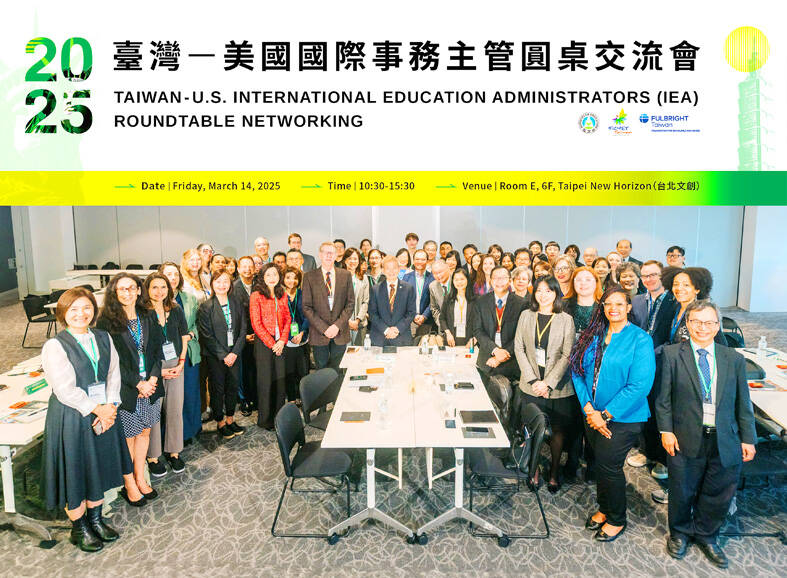This year’s Taiwan-US International Education Administrators (IEA) Roundtable Networking took place in Taipei yesterday, held jointly by the Foundation for International Cooperation in High Education of Taiwan (FICHET) and the Foundation for Scholarly Exchange.
Nearly 70 representatives from 40 Taiwanese and 16 American universities attended, seeking to deepen higher-education ties between both countries and promote further collaboration.
Lee Yu-jiuan (李毓娟), director general of the Ministry of Education’s Department of International and Cross-strait Education, said that over the decades, there have been more than 2,000 exchanges between Taiwanese and US higher-education institutions.

Photo coutersy of the Foundation for International Cooperation in High Education of Taiwan
More than 20,000 Taiwanese study in the US, while 4,000 Americans study in Taiwan, she said.
The 2020 US-Taiwan Education Initiative fostered new collaborations in language education, and more than 60 percent of American students in Taiwan are in Mandarin language programs, she added.
The Ministry of Education contributed by sending 70 Mandarin teachers and teaching assistants to the US last year, she added.
The US is an important partner for Taiwan’s higher education, FICHET chairperson Wu Cheng-chih (吳正己) said.
The US-Taiwan Education Initiative has broadened exchanges among academics and students, enhanced science, technology, engineering and mathematics collaboration, and expanded support for language programs, Wu said.
These efforts have already yielded results, he added.
The Foundation for Scholarly Exchange, also known as Fulbright Taiwan, has been a key part of efforts to encourage US education delegations to Taiwan and promote people-to-people exchanges, he said.
Fulbright Taiwan promotes bilateral engagement through various initiatives, such as its internship program, which supports Taiwanese students and academics studying in the US, Fulbright Taiwan Executive Director Randall Nadeau said.
The foundation also organizes lectures, events related to Taiwan-US ties, short-term programs and bilateral visits, he said.
First Education Secretary Canny Yi-Ken Liao (廖苡?) from the Ministry of Education’s Department of International and Cross-Strait Education, spoke about the status of educational cooperation initiatives.
From the US, Anize Appel, dean of the Center for Global Education at Pennsylvania’s Moravian University, and Christina Kinney, director of International Education and Global Engagement at Pennsylvania’s Kutztown University, talked about their own experiences and perspectives of international collaborations and the distinctive qualities of US higher education.

Taiwan has received more than US$70 million in royalties as of the end of last year from developing the F-16V jet as countries worldwide purchase or upgrade to this popular model, government and military officials said on Saturday. Taiwan funded the development of the F-16V jet and ended up the sole investor as other countries withdrew from the program. Now the F-16V is increasingly popular and countries must pay Taiwan a percentage in royalties when they purchase new F-16V aircraft or upgrade older F-16 models. The next five years are expected to be the peak for these royalties, with Taiwan potentially earning

STAY IN YOUR LANE: As the US and Israel attack Iran, the ministry has warned China not to overstep by including Taiwanese citizens in its evacuation orders The Ministry of Foreign Affairs (MOFA) yesterday rebuked a statement by China’s embassy in Israel that it would evacuate Taiwanese holders of Chinese travel documents from Israel amid the latter’s escalating conflict with Iran. Tensions have risen across the Middle East in the wake of US and Israeli airstrikes on Iran beginning Saturday. China subsequently issued an evacuation notice for its citizens. In a news release, the Chinese embassy in Israel said holders of “Taiwan compatriot permits (台胞證)” issued to Taiwanese nationals by Chinese authorities for travel to China — could register for evacuation to Egypt. In Taipei, the ministry yesterday said Taiwan

Taiwan is awaiting official notification from the US regarding the status of the Agreement on Reciprocal Trade (ART) after the US Supreme Court ruled US President Donald Trump's global tariffs unconstitutional. Speaking to reporters before a legislative hearing today, Premier Cho Jung-tai (卓榮泰) said that Taiwan's negotiation team remains focused on ensuring that the bilateral trade deal remains intact despite the legal challenge to Trump's tariff policy. "The US has pledged to notify its trade partners once the subsequent administrative and legal processes are finalized, and that certainly includes Taiwan," Cho said when asked about opposition parties’ doubts that the ART was

If China chose to invade Taiwan tomorrow, it would only have to sever three undersea fiber-optic cable clusters to cause a data blackout, Jason Hsu (許毓仁), a senior fellow at the Hudson Institute and former Chinese Nationalist Party (KMT) legislator, told a US security panel yesterday. In a Taiwan contingency, cable disruption would be one of the earliest preinvasion actions and the signal that escalation had begun, he said, adding that Taiwan’s current cable repair capabilities are insufficient. The US-China Economic and Security Review Commission (USCC) yesterday held a hearing on US-China Competition Under the Sea, with Hsu speaking on